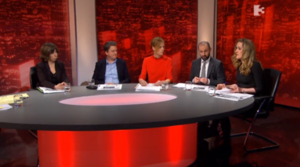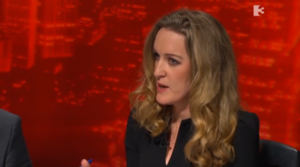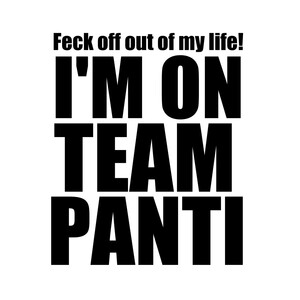From top: Historian Niamh Puirseil; director of the Iona Institute David Quinn; senior reporter with Today FM Juliette Gash; John Devitt, of Transparency International Ireland; and Irish Independent columnist Colette Browne
Last night, on Tonight with Vincent Browne, the panel spoke about the so-called Panama Papers – a leak of 11.5 million documents, involving nearly 215,000 companies and 14,153 clients, from the database of the world’s fourth biggest offshore law firm, Mossack Fonseca in Panama.
The papers show how some world leaders, politicians and high-profile figures have been able to hide large stashes of money.
Yesterday, Colm Keena in the Irish Times, reported that former Fine Gael director of elections and strategist Frank Flannery featured in the papers, in relation to the purchase of a house in London, in the 1990s.
Mr Flannery has said no offshore company was involved in the sale.
Grab a tay.
John Devitt: “It should be pointed that out: Panama isn’t the only secrecy jurisdiction or financial centre that can be used to facilitate these corrupt and criminal transactions. Dublin has also been at the centre of some controversy in the past and the use of complex financial instruments such as hedge funds have come under some scrutiny recently. So the IFSC has served and is believed to have served as a vehicle through which dirty money has been laundered.”
Vincent Browne: “What’s the evidence for that?”
Devitt: “Well we know for example, most recently, that the family of Sani Abacha, a former Nigerian dictator, were…”
Vincent Browne: “Say that name again and say it very clearly because…”
Devitt: “Sani Abacha. He’s a former…”
Vincent Browne: “Ok..I thought it might be confused with a name of a senator here who’s certainly isn’t engaged in…”
Devitt: “The point is that he was, or his family, he’s now deceased but his family was subject to proceeds of crime action by the UK authorities and they sought the assistance of the Criminal Assets Bureau here to locate the Abacha or one of the members of the Abacha family so that they could retrieve money that was believed to have been laundered in Irish banks. There are also cases involving the use of Irish insurance companies, going back to 2006, if not earlier, that earned Ireland the tag as the ‘wild west of European finance’. There were re-insurance deals involving a company based in the IFSC that facilitated a $500million fraud. Much of this was going on without any scrutiny.”
Vincent Browne: “We’ve been assisting mega corporations to avoid tax on a massive level for years and years and it’s part of what we are. It’s our selling card.”
Devitt: “Ireland’s reputation as a lightly regulated economy was a calling card for the government for a number of years and still is to a large degree. While regulation might have been tightened up since the banking crisis, Ireland is still not considered to be one of the most stringently regulated financial centres in Europe. There are moves being made to tighten it up somewhat and we’ve made, we know that shelf companies have been outlawed since the introduction of the new Companies Act.”
Vincent Browne: “Colette, you’ve been reading about this.”
Colette Browne: “Yeah, I have and it’s very interesting. There’s 11 million documents – 2.5 terabytes of data, so it’s an absolutely huge file. And it’s been revealed that 58 relatives and friends of kinds, prime ministers and presidents all around the world who are involved in this – so stashing money in these offshore accounts. So, as per usual, it’s people in positions of authority recommending cuts for the little people while they solve their money away in these bank accounts in secrecy and pile up these massive wads of cash. Now Richard Bruton today came out and said that if there was any Irish people that were engaged in any illegality, I think his exact words: ‘you can be absolutely sure that tax evaders will be vigorously pursued’. And I was doing a story recently on white collar crime and what I found out was quite shocking. That the Office of Director of Corporate Enforcement hasn’t had a forensic accountant employed for a year. So between March last year and March this year. In 2004 the Director of the Office of Director of Corporate Enforcement said that the agency wouldn’t be credible unless it had more, it had one forensic accountant at the time. Last year, in its annual report, it was given permission to hire six additional forensic accountants so that it could go after large scale white collar crime in this country. Instead it has zero forensic accountants, so we’re talking about a country which experienced the biggest financial crash in the history of the world and we have our prime regulatory body, which is supposed to investigate white collar crime, which didn’t have a forensic accountant for the last year. Now Remy Farrell is a senior counsel, who prosecutes these types of crimes, and he was speaking about this in 2004, or 2014 rather and he said that Ireland at the time was like a tinpot dictatorship because it had only one forensic accountant in this body. For the last year, we’ve had no forensic accountant.”
Devitt: “It’s not just the ODCE, mind you, that is short of resources. The Criminal Assets Bureau, the GBFI, the Garda Bureau for Fraud Investigation are grossly under resourced and I’m not sure that’s by accident. I think there’s been a policy going back a number of years now to turn a blind eye to this kind of crime.”
Colette Browne: “But to have politicians come out and say that these people will be vigorously pursued and then to have the State’s main regulatory body, which is supposed to pursue these people, without having the technical expertise to go after them I mean, it’s actually a joke.”
Watch back in full here







“Lightly regulated” = complicit in wholesale criminality.
We don’t have an open economy, it’s a fully prostrate economy.
Ireland, best little country to be corrupt in!
The Golden Circle Jerk continues.
Why is David Quinn on there?
He brought his own Opus Dei branded flagellating whip and gimp mask with fluffy zipper.
…are the iona institute still eating people?
I’d say aul Dave dreams of being eaten by young men anyway.
That’d be Dave Quim, his alter ego.
Don’t say drugs, rent boys or the names of anyone in that picture or you get modded.
I’ll just bow out now then if we’re ruling half my vocabulary out of order >_<
#gerrup
i like david quinn he speaks well and I find him a good guest on shows.
Ireland is used by the usual families (political, business and legal) to line each other’s pockets through enacting laws that suit their agendas and ignoring laws that don’t.
It’s a deeply corrupt country and it does go from the bottom right to the top. It’s ingrained, a lack of civil responsibility and it’s exploited to the fullest by those with money.
We need to stop being Irish.
Where are you Tish Mahorey?
I am beyond reproach of course.
(somewhere in the middle)
Biffo country?
In as much as we have a problem, it is yours.
An ingrained simultaneous sense of being useless but also unique. Every single country grapples, partially successfully & partially not, with these problems.
We’re not special. We just need to confront these problems.
We should get the government to write a report on it.
it’d look good on a shelf some where.
What you don’t see are the selfless thousands of Irish people who volunteer their time to organise sports clubs for kids, organise to get schools built due to the state’s failure to plan, organise activities for the elderly, help homeless fellow citizens every night, tidy-towns committees, credit unions, helpers the infirm – thousands of things get done in this country off the back of those with a sense of responsibility to our society despite the well-spoken greasy scumbags in-charge.
Being Irish is not the reason we have a poo state of affairs.
+1
Catherine Murphy put it best
We’re a great country despite our politics. Let’s be a great country because of our politics.”
While I think Flannery a despicable human his is not the story with flesh in these files, Grehans salting of assets should have taxpayers fizzing
That’s a sher-bet!
.
.
.
.
I’ll just leave now.
ah no stay, that was a good one
You got me !
who does Colette’s do.
our governments weird obsession with doing the biddings of foreign fat cats rolls on. id love to ask them why they do it, but they obviously wouldnt answer, theyd deny it. but id say with a gun to the head, they’d tell you they give them leeway to attract foreign business to the country .. but at what return? very little. they pay next to nothing in corporate tax, and from what i see in the offices of google, facebook, twitter etc., they’ve brought in very little jobs as 90% of the staff in those places have been brought in from abroad. so back to why? why do we bend over for them so much? is it a strange insecurity thing? where our leaders know theyre fish out of water, they arent qualified for high powered jobs, so gettin rings ran around them by foreigners taking advantage of their ill-knowledge.. legitimises what theyre doing? once theyre doing deals with foreigners in power, who know what theyre doin, then they too must know what theyre doing? by affiliation at least?
So we live in a country where we have entire teams of Gardai spying on water protesters and where social welfare and Gardai team up to randomly stop vans coming out of houses in estates to find welfare cheats, but we can’t afford a single forensic accountant? FFS